- Home
- Richard Lee Byers
The Spectral Blaze Page 9
The Spectral Blaze Read online
Page 9
Two fellows in the scarlet jupons of the War College’s household guards scurried to the center of the hall and dropped to their knees before him. Their faces were pale and sweaty.
“What do you have to say for yourselves?” Tchazzar asked.
One, with a bald spot in the middle of his light brown hair, said, “Please, Majesty. We were told the dwarf was the priests’ responsibility, not ours. We were told not to go anywhere near him.”
“But he had to go near you to leave the dungeons, didn’t he?” Tchazzar replied. “The undead creature had to pass by you twice.”
The man with the bald spot swallowed. “I guess. I mean, maybe. But if he was magic—”
Tchazzar slapped him.
Except that it had to be more than a slap because it trailed spatters of blood in its wake. And as Tchazzar completed the swing, and the guard doubled over, shrieking and clutching at the tattered remains of his face, Hasos saw that the war hero’s hand had changed. It was too big for his arm. The skin had turned to dull red scales, and the nails, to long, curved claws.
The other guard tried to fling himself backward, but he was too slow. Tchazzar snatched and shredded his face too, and he collapsed to writhe and whine beside his comrade. His stomach churning, Hasos wondered if either of them had an eye left.
“Now,” Hasos said, “let the surviving priests come forward.”
The wyrmkeeper with the bandaged head hobbled away from the wall. So did another, who clutched a bloody handkerchief. His upper body jerked repeatedly as he apparently tried to hold in a series of coughs.
“Your fault is as great as theirs,” said Tchazzar, returning to his throne. “But fortunately for you, if I punished you as you deserve, it would upset your high priestess. So I’m willing to forgive you. I only ask that you sacrifice these two wretches to me.”
The wyrmkeeper with the battered head grinned like a fool. The coughing man let out a sigh and closed his eyes for a moment.
“Majesty,” said the bandaged priest, “it will be our very great honor. Perhaps some of the guards could hold the sacrifices and lend us daggers.”
“No,” the war hero said. “Do it by yourselves, with your bare hands. That’s the form of sacrifice your god desires today.”
The wyrmkeepers hesitated. They looked as if they’d been hardy enough before fighting the vampire, but now they were wounded and weak.
“Go on,” Tchazzar said. “I softened them up for you.”
The wyrmkeepers kneeled down beside the guards and tried to seize hold of their throats. Up until then, the mutilated soldiers had seemed too lost to shock and agony to resist anything else that anyone might want to do to them, but then, floundering in their own blood, they flailed blindly, frantically, and knocked the wyrmkeepers’ hands away.
To Hasos’s eyes, the struggle that followed was horribly reminiscent of farm boys fighting to catch greased pigs at a fair, and it seemed to last forever. So did Tchazzar’s peals of laughter as they echoed from the ornately finished sandstone walls.
* * * * *
Khouryn looked around the chamber full of dragonborn, a hall decorated with the weapons and armor of famous wyrm slayers and the fangs, claws, and whole skulls they’d taken as trophies, and for a moment, he had the odd feeling he’d never left, that his return to Luthcheq had simply been a nightmare.
Still, it was easy to spot changes. Medrash carried the greatsword denoting high status and wore the batwing badge of the Lance Defenders. Along with the steel-gauntlet medallion signifying his devotion to Torm, god of justice, and the six ivory studs pierced into his rust-colored saurian left profile to denote his membership in Clan Daardendrien, they made for quite a collection of honors and adornments. Ocher-scaled, and small by dragonborn standards, his kinsman Balasar bore all but the Torm medallion too.
Each of Khouryn’s friends had changed his demeanor as well. During most of the time the dwarf had known Medrash, the paladin had been careworn and afflicted with self-doubt. But even after hearing why Khouryn had come back, he seemed more at ease in his own skin. In contrast, the notoriously jaunty, flippant Balasar looked nervous as Kanjentellequor Biri chattered to him. Accounted pretty by her own kind, the young mage had snow white scales, a rarity. Silver skewers pierced the edges of her face, with most of their lengths sticking out behind.
“It looks to me,” Khouryn murmured, “like Balasar has yet to resign himself to marriage.”
“He’s just being perverse,” Medrash replied. “He wants her as much as she wants him, and if she were willing to settle for being just another notch on his tally stick, he’d pounce on her like a hungry cat on a mouse. But he’s always resisted anything our elders wanted him to do. Fortunately, he’s got me looking out for his best interests. If I keep pushing the two of them together, eventually nature will take its course.”
“And meanwhile, you have the fun of watching him squirm.”
Medrash bared his fangs in what Khouryn had learned to recognize as a dragonborn grin. “A holy warrior of Torm is above such pettiness. Although the stars know, over the years he’s subjected me to more than my share of pranks and japes.”
A servant struck a bronze gong three times, and the notes shivered through the hall. Khouryn took a breath, forgot about friendly banter, and readied himself to repeat news that was just about as grim as it could be.
“All hail Tarhun!” a different functionary called. And they all did, bowing and sweeping their hands outward as the vanquisher strode through a doorway at the back of the chamber.
The ruler of Tymanther was also its greatest warrior, and he looked it. He was taller and had broader shoulders than any of his subjects. He carried square bits of gold pierced under his eyes like teardrops, and his green hide was mottled where a dragonspawn’s fire had burned him. He was dressed in rugged leather.
“Rise,” he rumbled. “I’m sorry I made you wait. I was out flying.” He turned his gaze on Khouryn. “My good friend. Ordinarily I’d call your return a cause for celebration. But I understand it isn’t so.”
“No, Majesty,” Khouryn said. “I’m afraid not.”
“Then you’d better step forward and tell us all about it.”
Khouryn did his best, although he didn’t think his best was particularly good. He was neither a bard nor a schemer, and the tale was just too tangled. By the Finder-of-Trails, he wasn’t even sure that he fully understood it himself. He’d heard it only once, from Jhesrhi as they fled Tchazzar’s dungeons, and then he’d had the urgency of escape and the leftover pains of torture to distract him.
Still, it seemed that his audience understood at least a part of it. Enough to make them exclaim in shock and grow visibly more dismayed with every word.
When he finished, Tarhun shook his head. “I knew we were in danger of losing Chessenta’s friendship, but I never dreamed it would come to this.”
“If Shala Karanok were still on the throne,” Khouryn said, “it probably wouldn’t. But somehow, Tchazzar’s back, and he’s apparently a real dragon. The dragons are all playing a game; it’s worth a lot of points to conquer Tymanther—well, you heard it the first time I explained it.”
“Yes,” Tarhun said, “and mad as it seems, I believe it. It explains why Skuthosin moved against us at this particular point in time. But he’s yesterday’s problem. How will we counter this new one?”
“Fight,” rapped Fenkenkabradon Dokaan. The commander of the Lance Defenders was almost as hulking as Tarhun. He had bronze-colored scales and branching steel piercings sticking up from his temples like antlers. “Smash the Chessentans and Akanûlans just like we broke Skuthosin and the ash giants.”
“Of course,” Tarhun answered, “we’ll prepare to the best of our ability and fight to the last warrior if need be. That’s our way. That’s how our forefathers won their freedom from wyrms every bit as terrible as Skuthosin and this Tchazzar. Still, we have to be realistic. Defeating the giants cost us. It’s hard to see how we can turn right around, fight
Chessenta, Akanûl, and Threskel all at once, and come out on top.”
Khouryn said, “There might be another way.”
Tarhun cocked his head. “If so, I’m eager to hear it.”
“Except for Medrash, Balasar, and Perra,” Khouryn said, “none of you know Captain Fezim. But he’s sharp. And as I understand it from Jhesrhi Coldcreek, when he found out about this game, he more or less analyzed the play, looking for a way to relieve the pressures that are driving the lands around the Alamber Sea to do what the dragons want.”
Tarhun nodded. “Go on.”
“Akanûl is coming to attack you partly because its queen blames you for a series of raids and massacres. Thanks to Alasklerbanbastos, we now know that a gray dragon and his servants are really responsible. Aoth and others have slipped off to Airspur to prove it. If they do, maybe the genasi will pull out of the alliance with Chessenta.”
“And maybe not,” Dokaan said. “They hated us before this insanity ever began, before the Blue Fire ever scooped up our two kingdoms and dropped them here in Faerûn. And even if they don’t come, I suspect the Chessentans still will.”
“And I suspect you’d be right,” Khouryn said, “if that were all of the plan.”
Balasar grinned. “It sounds like we’re getting to the part where we get to have some fun.”
Khouryn snorted. “That’s one way of putting it. Majesty, I remember when you asked High Imaskar for help against the giants. They said they couldn’t give it because creatures out of the Purple Dust were attacking their lands. According to Alasklerbanbastos, that, too, is a part of the game. A dragon named Gestanius created the crisis to cut you off from help.”
“The same Gestanius who was Skuthosin and Tchazzar’s ally hundreds of years ago?” Biri asked.
Khouryn shrugged. “I’m no authority on dragons, but that would be my guess. The important thing is, Alasklerbanbastos told my friends where to find Gestanius, and Jhesrhi told me. If some of us go to High Imaskar, join forces with the locals, and kill her, the attacks will stop, freeing up the Imaskari to come to your aid in return.”
“So if everything works,” Medrash said, “Tchazzar loses an ally, and we gain one. And faced with such a radical shift in the balance of power, he ought to call off the invasion.”
“Even if he doesn’t,” Khouryn said, “you’ll be in a much better position to fight him. By the Twin Axes, even if only half the plan works, you’re still better off.”
Dokaan shook his head. It made the little steel antlers glint. “Majesty, I don’t like it.”
“Why not?” Tarhun asked.
“Because it’s all based on the presumption that Alasklerbanbastos, who isn’t just a dragon but an infamous, undead one, told Captain Fezim and his companions the truth.”
“They had the means to wring it out of him,” Khouryn replied.
“Are you certain of that?” Dokaan asked. “Do you truly understand the magic involved?”
Khouryn shook his head. “Not a bit of it. But Jhesrhi said she does, and that’s good enough for me.”
“And I trust your judgment,” Tarhun said. “It was sound during the campaign against the giants. Still, I understand why Dokaan is reluctant to see anyone dispatched on such a … speculative mission. We’re likely to need every warrior we have to stand against the invaders.”
“Maybe not every warrior,” Medrash said. “The soldiers of the Platinum Cadre fought well against the giants, but the rest of the army still doesn’t trust them very far. That could limit their usefulness on this side of the sea. So why don’t Khouryn and I take them to High Imaskar?”
“Dokaan,” Tarhun said, “do you agree that’s a reasonable plan?”
Dokaan shrugged. “Medrash is right. They fought pretty well. Still, if we have to excuse somebody from a fight with a dragon, it might as well be our company of dragon worshipers.”
“I ask to be excused too,” Balasar said. “Medrash, Khouryn, and I made a good team before.” He grinned. “I supplied the brains and panache, and they, the … well, I’m sure there was something.”
Tarhun snorted. “Fine, you can go too.”
“And me?” Biri asked.
Balasar turned back around to face her. “My lady, don’t you think you’re needed here? There aren’t many dragonborn mages, whereas High Imaskar is a land of wizards. When we get there, we’ll have all we need.”
“Yes,” she said, “when you get there. But I’m under the impression that every moment counts. And I have some power over wind and weather. I can ensure a speedy voyage.”
“That sounds good to me,” Medrash said.
“And to me,” Tarhun said. “Fetch Nellis Saradexma,” who, Khouryn recalled, was the Imaskari ambassador. “He can go too to speed things along when you reach your destination.”
* * * * *
Selûne’s silvery light seemed incapable of penetrating the depths of the gorge. It was as though the aura of death and despair emanating from the bottom held it at bay.
There was power in that feeling, and if he were still wearing his old body, Alasklerbanbastos would simply have plunged into the crevasse to claim it for his own. Now, however, he had to consider the possibility that something else, something capable of harming the diminished creature his enemies had made of him, had gotten there first. And so, hating it, he crawled warily down the precipitous wall of the crevasse.
Like most undead, he could see in the dark, although not as far as a man could see by day, and he soon discerned that when the Spellplague raged and the earth convulsed, that crack had opened and swallowed a town. Most of the buildings lay broken and half buried at the bottom. Although, looking as if a breath would suffice to dislodge them, a few houses clung to the sides.
Something fluttered. Alasklerbanbastos looked around. Birds, or things like the shadows of the birds, were landing on the roof of the nearest house. They didn’t seem to be flying in from somewhere else so much as taking shape from the ambient gloom, and it was only the attitude of their bodies that told the dracolich they were looking back at him. He couldn’t pick out a gleam of eyes or a hint of feathery texture anywhere on their vague, almost flat-looking forms.
He considered blasting them with his breath. But so far, they weren’t doing anything hostile, and perhaps they wouldn’t. He was still a dracolich, after all, a being most creatures feared to provoke. So he simply continued his descent, and the ghostly flock simply kept pace with him, flying from one broken rooftop to the next.
When he reached the bottom, he could feel a gradation in the palpable memory of anguish. It festered on every side but was foulest in the direction of the fortresslike temple of Helm the Watcher, lying on its side. Alasklerbanbastos surmised that many of the townsfolk had fled there to pray for succor when the upheavals began, and there they’d perished when it never came.
Picking his way through rubble and bones, Alasklerbanbastos headed in that direction. The black birds divided. They still kept pace with him, but some flew and perched to the right, and the rest, to the left.
Then other creatures, similarly murky but somewhat manlike, came out of the dark. Those bearing scythes stalked from behind cover. Others simply flickered into view. All barred the path to the temple.
Once again, Alasklerbanbastos felt the urge simply to smite the impudent mites, and once again he held it in check. “Who commands here?” he asked. “I assure you, it’s in your best interest to parley with me.”
Yet another dark figure emerged from behind the others. But this one had scalloped wings like Alasklerbanbastos’s own sprouting from his shoulder blades, spindly horns like the points of a jagged diadem jutting from his head, and round, luminous red eyes. The dragon could just make out a few of the runes engraved on the blade of the newcomer’s scythe.
That was enough to confirm that the creatures were sorrowsworn, haunters of sites where mortals had perished in pain, in terror, and in quantity. Alasklerbanbastos had assumed as much, but the things resembled a number o
f other denizens of the netherworld, and it was always better to be sure.
“You’re intruding on a sacred place,” the deathlord said.
For an instant Alasklerbanbastos wondered what deity or quasi-deity the sorrowsworn served, then decided he didn’t care. “A useful place,” he replied. “I need to borrow it for a while.”
“No,” the deathlord said.
“I need to tap the kind of power a place like this provides. I promise to leave it as I found it.”
“No,” the red-eyed creature repeated, then hesitated, as though deciding how much more he wanted to say. “Something seeks to be born in the house of the fallen god. It was conceived forty years ago and must gestate undisturbed for twenty more. Leave now while—”
Alasklerbanbastos spit a crackling flare of lightning. The deathlord floundered backward, jerking in a spastic dance.
But when the lightning flickered out of existence, he didn’t collapse. Instead, his seared flesh smoking, he screamed a command in a language that even Alasklerbanbastos didn’t recognize.
The shadowravens instantly hurtled at the dracolich from all sides. By itself, each little peck of a beak or scratch of a talon would have been insignificant, but dozens every instant were a different matter. Worse, the birds flapping around his head all but blinded and deafened him, allowing the sorrowsworn to advance unopposed. Scythes sliced along his ribs, the blades bumping and catching on his bones.
He swept his head from side to side and burned shadowravens out of the air with an arc of lightning. Or rather, he tried. In his old body, he could have used his breath weapon several times before depleting it, but in his new one, he’d exhausted it with a single exhalation.
A shock ripped through the base of his neck. One of his foes—the deathlord, he suspected—had driven a scythe in deep. Another stroke or two like that could cripple him.
He leaped into the air, lashed his wings, and soared upward.
That rid him of all the foes who didn’t have wings to follow. He swiped with his claws, smashing birds by the dozen, and snarled an incantation. Meanwhile, he felt some sort of psychic magic pounding at his mind. But it wasn’t divine power like the despicable sunlady wielded, and it couldn’t pierce his defenses.

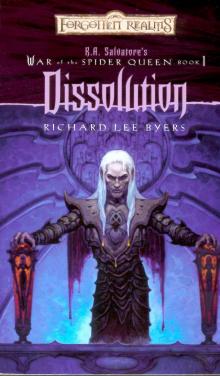 Dissolution
Dissolution Arkham Horror- Ire of the Void
Arkham Horror- Ire of the Void The Haunted Lands: Book II - Undead
The Haunted Lands: Book II - Undead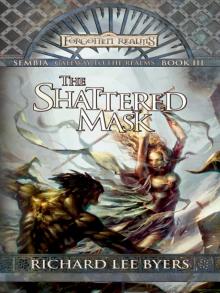 The Shattered Mask
The Shattered Mask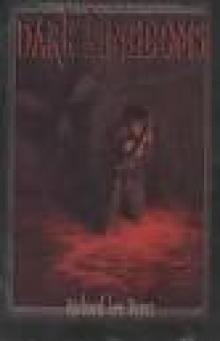 Dark Kingdoms
Dark Kingdoms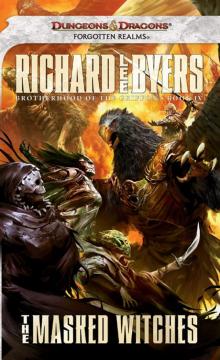 The Masked Witches: Brotherhood of the Griffon, Book IV
The Masked Witches: Brotherhood of the Griffon, Book IV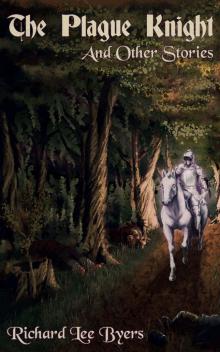 The Plague Knight and Other Stories
The Plague Knight and Other Stories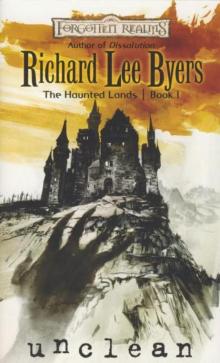 Unclean: The Haunted Lands
Unclean: The Haunted Lands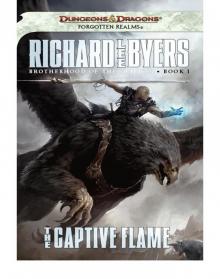 The Captive Flame: Brotherhood of the Griffon • Book 1
The Captive Flame: Brotherhood of the Griffon • Book 1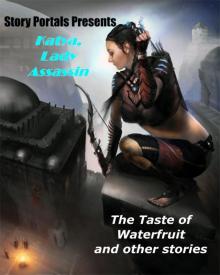 The Taste of Waterfruit and Other Stories (Story Portals)
The Taste of Waterfruit and Other Stories (Story Portals)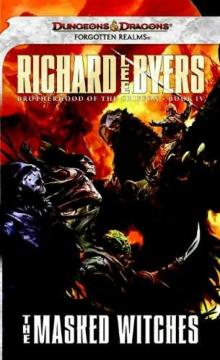 The masked witches botg-4
The masked witches botg-4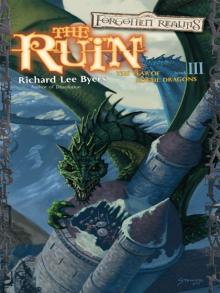 The Ruin
The Ruin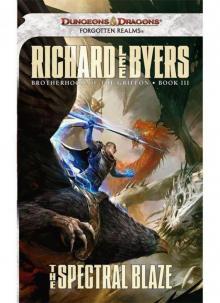 The Spectral Blaze botg-3
The Spectral Blaze botg-3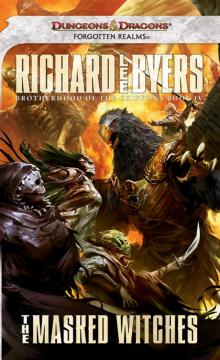 The Masked Witches
The Masked Witches Blind God's bluff bf-1
Blind God's bluff bf-1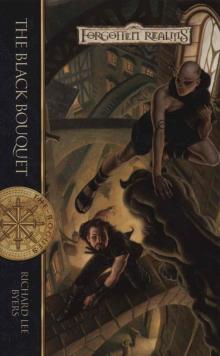 The Black Bouquet r-2
The Black Bouquet r-2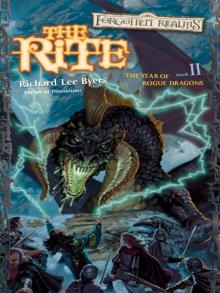 The Rite
The Rite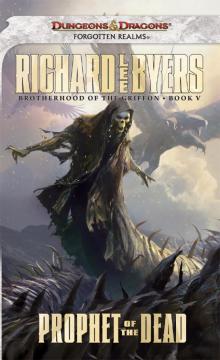 Prophet of the Dead: Forgotten Realms
Prophet of the Dead: Forgotten Realms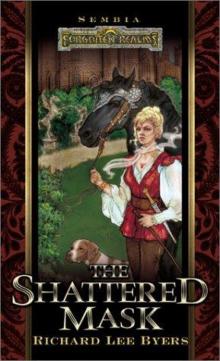 The Shattered Mask s-3
The Shattered Mask s-3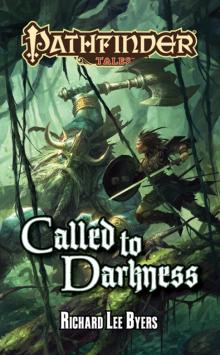 Called to Darkness
Called to Darkness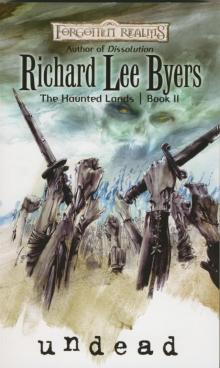 Undead hl-2
Undead hl-2 Blind God's Bluff: A Billy Fox Novel
Blind God's Bluff: A Billy Fox Novel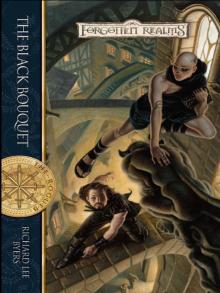 The Black Bouquet
The Black Bouquet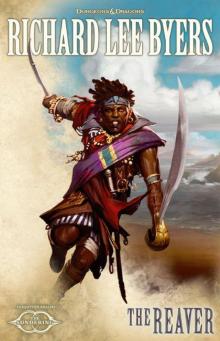 The Reaver
The Reaver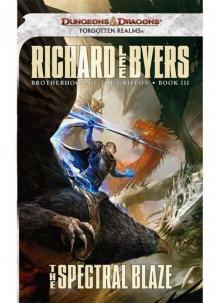 The Spectral Blaze: A Forgotten Realms Novel
The Spectral Blaze: A Forgotten Realms Novel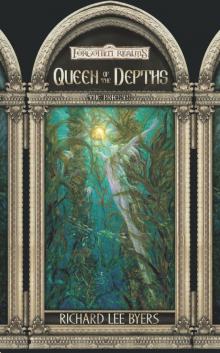 Queen of the Depths
Queen of the Depths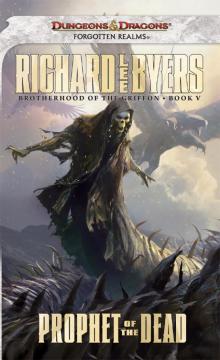 Prophet of the Dead botg-5
Prophet of the Dead botg-5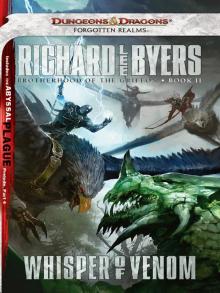 Whisper of Venom: Brotherhood of the Griffon, Book II
Whisper of Venom: Brotherhood of the Griffon, Book II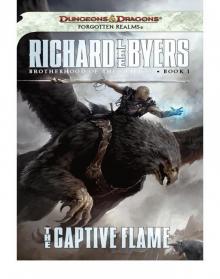 The Captive Flame botg-1
The Captive Flame botg-1 The Haunted Lands: Book III - Unholy
The Haunted Lands: Book III - Unholy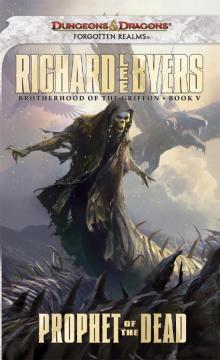 Prophet of the Dead
Prophet of the Dead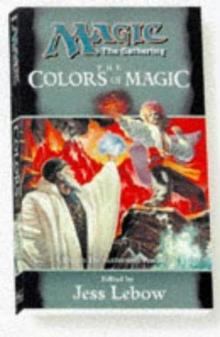 The Colors of Magic Anthology (magic: the gathering)
The Colors of Magic Anthology (magic: the gathering)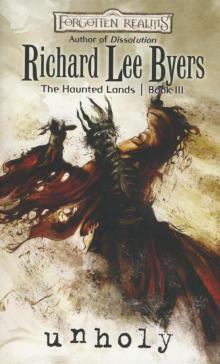 Unholy hl-3
Unholy hl-3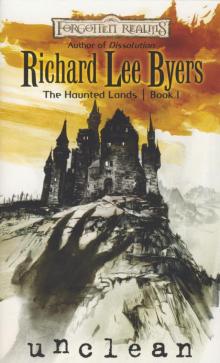 Unclean hl-1
Unclean hl-1 Blind God's Bluff
Blind God's Bluff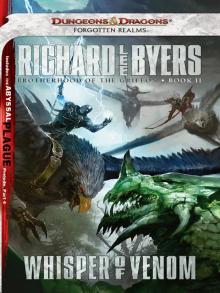 Whisper of Venom botg-2
Whisper of Venom botg-2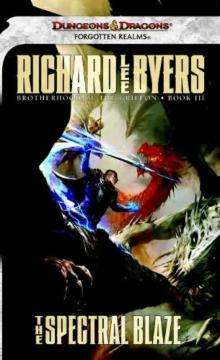 The Spectral Blaze
The Spectral Blaze